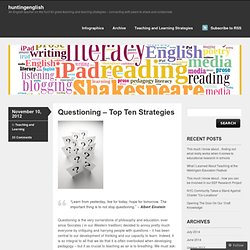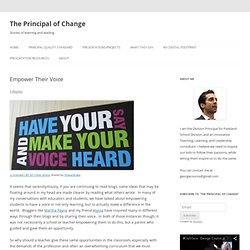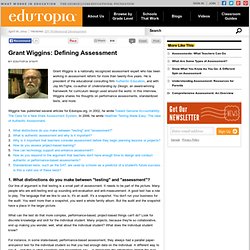

Questioning – Top Ten Strategies. “Learn from yesterday, live for today, hope for tomorrow.

The important thing is to not stop questioning.” – Albert Einstein Questioning is the very cornerstone of philosophy and education, ever since Socrates ( in our Western tradition) decided to annoy pretty much everyone by critiquing and harrying people with questions – it has been central to our development of thinking and our capacity to learn.
Indeed, it is so integral to all that we do that it is often overlooked when developing pedagogy – but it as crucial to teaching as air is to breathing. We must ask: do we need to give questioning the thought and planning time something so essential to learning obviously deserves? Do we need to consciously teach students to ask good questions and not just answer them? Most research indicates that as much as 80% of classroom questioning is based on low order, factual recall questions. 1. 2. 3. 4. 5. Q1. 6. 7. 8. 9. 10. Added Extras: Empower Their Voice. Cc licensed ( BY SD ) flickr photo shared by HowardLake It seems that serendipitously, if you are continuing to read blogs, some ideas that may be floating around in my head are made clearer by reading what others wrote.

In many of my conversations with educators and students, we have talked about empowering students to have a voice in not only learning, but to actually make a difference in the world. Bloggers like Martha Payne and my friend Alyssa have inspired many in different ways through their blogs and by sharing their voice. In both of those instances though, it was not necessarily a school or teacher empowering them to do this, but a parent who guided and gave them an opportunity. So why should a teacher give these same opportunities in the classroom, especially with the demands of the profession and often an overwhelming curriculum that we must cover. Stephanie, 22, wrote a piece in December critiquing a popular toy company’s new line that was marketed for girls. Grant Wiggins: Defining Assessment.
Grant Wiggins is a nationally recognized assessment expert who has been working in assessment reform for more than twenty-five years.

He is president of the educational consulting firm Authentic Education, and with Jay McTighe, co-author of Understanding by Design, an award-winning framework for curriculum design used around the world. In this interview, Wiggins shares his thoughts on performance assessments, standardized tests, and more. Wiggins has published several articles for Edutopia.org. In 2002, he wrote Toward Genuine Accountability: The Case for a New State Assessment System. In 2006, he wrote Healthier Testing Made Easy: The Idea of Authentic Assessment. 1. Our line of argument is that testing is a small part of assessment. What can the test do that more complex, performance-based, project-based things can't do?
Back to Top 2. Authentic assessment, to me, is not meant to be the charged phrase, or jargony phrase that it has come to be for a lot of people. Resources « McTighe & Associates. Enduring Understandings.mov. Backward Design.